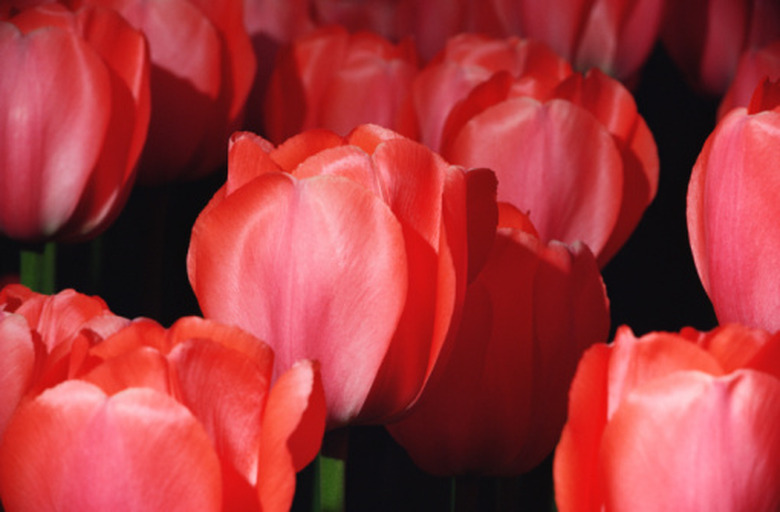Should You Cover Tulips From A Frost?
Tulip bulbs rarely suffer from a little winter frost. Tulip bulbs go dormant under the frozen ground waiting for spring's warming soil to stimulate new growth. Plant tulips in the fall for spring and summer flowers, using a layer of mulch to protect the ground during cold months. If a heavy late-spring frost threatens, cover the tender new shoots so they don't freeze.
Tulips Bulbs and Frost Heave
The general rule when planting tulip bulbs is to plant them three times deeper in the soil than the height of the bulbs. This usually means a planting depth of 6 to 8 inches. In areas that freeze heavily, a slightly deeper planting depth of 8 to 10 inches provides the bulbs with more protection. When the ground freezes and thaws, it tends to heave and shift, dislodging the tulip bulbs and pushing them toward the surface. Tulip bulbs that are pushed too close to the soil surface lack the insulating cover of soil and can suffer freeze damage.
- Tulip bulbs rarely suffer from a little winter frost.
- Plant tulips in the fall for spring and summer flowers, using a layer of mulch to protect the ground during cold months.
Mulching Tulip Bulbs
Covering bulbs with a layer of mulch cuts down on heaving and insulates the soil. Plant tulips in the fall between September and December. Plant late enough in the season so that the weather is cold and will not stimulate growth too early, but not so late that the ground freezes hard. Cover the area over the tulip bulbs with a 4- to 6-inch layer of mulch in late fall. Straw, leaf mold, wood chips or peat moss work well. Clear the mulch coverage off the tulip bulbs in the spring to allow the ground to warm up.
Late Spring Frosts
Tulips put up tender new growth in spring. Though tulips are accustomed to cold climates, a heavy late-spring frost can still cause harm, at least to that year's flowers. Cover young tulip shoots with straw before the cold weather sets in. Take a bale of straw and separate out the flakes. Pull the straw apart until it is loose and light. Cover the young tulip plants 1 inch deep in straw. Use seed-free straw or you will be pulling grass from your tulip bed all summer. Remove the straw as soon as the cold weather passes.
- Covering bulbs with a layer of mulch cuts down on heaving and insulates the soil.
- Clear the mulch coverage off the tulip bulbs in the spring to allow the ground to warm up.
Tulip Bulbs and Climate
Tulips grow in U.S. Department of Agriculture plant hardiness zones 3 through 8. In zone 3, winter temperatures drop as low as 40 degrees below zero Fahrenheit. In the colder areas of zones 3 through 7, a good mulch layer helps protect the bulbs from excessive cold and frost heave. In milder zone 8, covering tulip bulbs with mulch is unnecessary. Tulip like cool climates and do not tend to grow well in zones 9 through 11 unless you remove the bulbs from the soil in the winter and chill them until spring.
